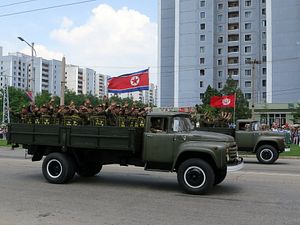In London, thousands of people gathered in the freezing rain to protest the new American president’s ban on refugees from seven Muslim-majority countries.
If people around the globe are willing to protest against Trump’s decision to reject refugees, where is the outrage toward China or Russia, who regularly round up and arrest North Korean refugees inside their borders, and return them to the North? Repatriated defectors sent back to North Korea face harsh penalties. They can be imprisoned in forced labor camps, or face the death penalty by execution.
China
Of North Korea’s two northern neighbors, China has the strictest policy toward North Korean defectors and takes active measures to locate and repatriate any found within its borders. Chinese security services actively cooperate with the DPRK to find, arrest, and repatriate any North Korean refugees who seek to transit China to other neighboring states, and have made it clear to their citizens that assisting the refugees in any way is illegal. Naturally, under those conditions, those North Koreans who do make it to China are extremely vulnerable to trafficking and coerced prostitution.
In the past, if defectors were able to reach foreign embassies and consulates, China has been willing to let defectors leave the country. However, getting to an embassy is often difficult. In a recent undercover documentary filmed by Jake J. Smith entitled While They Watched, a North Korean refugee family was filmed trying to enter the U.S. embassy. Blocked, they then attempted to enter the Japanese embassy next door but were attacked, beaten, and pulled away from the embassy by the Chinese police. They were sent back to North Korea.
Russia
Russia has never been sympathetic to North Korean refugees, granting permanent asylum to only two between 2004 and 2014. However, their repatriation policy was entrenched in 2014, when both countries signed an agreement to forcibly repatriate nationals from either country found to be residing in the other illegally. There are only an estimated 40 defectors that have managed to successfully escape to Russia and remain unnoticed.
The issue of North Korean defectors in Russia gained media attention again after Choe Myong-bok, a defector who has been hiding in Russia for nearly two decades, was arrested last week. He will be forcibly repatriated back to North Korea, despite human rights organizations claiming he faces certain execution if he is returned. Choe is currently awaiting results of an appeal to the European Court of Human Rights.
Choe is hoping to avoid sharing the fate of Ryu En-nam, who was forcibly repatriated from Russia back to North Korea in 2008. Once in North Korea, Ryu was dragged behind a train until death.
While some defectors manage to reach Russia from North Korea, often through the Siberian wastes, most North Koreans that become refugees in Russia defect while already working in the country as laborers. These workers are sent to timber and logging camps from Pyongyang with the promise of a better life, in order to earn money to send back to their families. There are an estimated 20,000 North Korean workers in Russia at any one time.
Russia, however, greets these defectors with little more than indifference. If anything, Moscow has strengthened ties to North Korea in recent years, signing an economic agreement only last spring to raise bilateral trade from $112 million to $1 billion by 2020 and laying down plans for a $340 million joint venture to build a new railway from the Russian border to the North Korean port of Rajin. Sadly, while Choe Myong-bok’s story may be the most recent tragic tale, it almost certainly will not be the last.
While one might argue that we hold the United States to higher standards than we do Russia or China, this is a meaningless argument to a North Korean citizen being taken back to be executed. And while Muslim refugees have a range of nearby countries – including Europe itself – where they might instead seek safety, North Koreans have pitifully few choices, with only three borders to choose from.
Our protests are hypocritical and prejudiced if we only seek to defend those who are the fashion of the week. The North Koreans have suffered for generations under one of history’s most brutal regimes and two countries regularly throw them to the wolves. Perhaps someone will light a candle outside the Chinese and Russian Embassies one day to remember these forgotten refugees.
John Hemmings is director of the Asia Studies Center at the Henry Jackson Society in the U.K. Talia Jessener is a researcher at HJS.
































